The Cult of National Heroes
In 2014, Europe celebrated the centennial of the start of WWI, an event that deeply scarred the 20th century.

Steliu Lambru, 14.12.2015, 14:32
In 2014, Europe celebrated the centennial of the start of WWI, an event that deeply scarred the 20th century. It was a century that put into practice ideas from the 19th century, ideas that themselves formed in late 18th century, around the French Revolution. Socialism and nationalism, generous ideas that aimed to emancipate individuals and society, had moved away from their original aim and had gone radical. Through the world war of 1914-1918, humanity had spent bloodily the raging energies of radicalism, but much of that energy was not spent, and would erupt in the Second World War.
Modern heroes are the product of wars that raged across Europe in the first half of the 20th century. Men and women of various social categories went to war with enthusiasm for their ideas. Romanians were no exception, and proof of that are the hundreds of thousands who died. In 1918, when the peace treaties were signed, the descendants of the 10 million dead left by the 4 years of conflict wanted to honor their sacrifice. This was the beginning of the cult of heroes in its grandiose, monumental form.
Historian Daniel Gheorghe: “After WWI, the Versailles peace treaty established the cult of heroes as a measure of reconciliation and rapprochement between the nations that had fought in the war that left tens of millions dead, politically, socially and morally. Romania was one of the first European countries that had taken on the responsibility of paying homage both to its heroes and to those of other nations that had fallen on Romanian soil fighting against Romanians. Hero day was created by decree by King Ferdinand I on May 4, 1920, one month before the treaty of Trianon, which endorsed the Union of 1918, after 3 years of fighting on the frontline, and two years of diplomatic struggle. In Paris, Queen Marie played a crucial role in the recognition of the union.”
All communities feel a need to celebrate their heroes. This cult in its modern state form was the result of the traumas inflicted by WWI. Here is Daniel Gheorghe:
“The cult of heroes also worked during the reign of Carol I, when the heroes of the 1877-1878 War of Independence were honored, as well as the heroes of the Battle of Dealul Spirii of 13 September 1848. In WWI, Romania lost around 960,000 citizens, mostly as a result of disease, epidemics and hardship. At least 350,000 Romanians died weapon in hand, 30,000 in the Battle of Marasesti alone, in July-August 1917, when, on the hottest day, 6,000 Romanians died. The sacrifice was immense, and the cult of heroes was the way of paying homage to them.”
In the years that followed the war, the cult of heroes manifested in various forms. The most important constructions, in addition to countless cemeteries, crypts, monuments and roadside crosses are the Mausoleum in Marasesti, the monument of the nameless hero in Bucharest, and the ensemble called Heroes’ Path built by sculptor Constantin Brancusi in Tg. Jiu.
Here is Daniel Gheorghe: “The cult was under the patronage of the Royal House and the Orthodox Church. There was a Society of Heroes’ Tombs, presided over by Metropolitan Miron Cristea. Romania had hundreds of tombs of Romanian heroes, but also those of other nationals, German, Russian, English, American, French, Hungarians, Bulgarians, Poles who died in the first and second world wars. The Society of Fallen Heroes, under Queen Marie’s high patronage, took care of the tombs. Queen Marie had been the head of the Romanian Red Cross, and the member of the Royal House most sensitive to the suffering of Romanian heroes on fields of battle.”
Heroes’ Day is today a day for all Romanian heroes who fell in battle against the enemies of democracy and freedom. December is a special month, full of symbolism, as it is the month when Romanians freed themselves from communism:
“Heroes’ Day was set on the day of the Lord’s Ascension, a day dedicated to all those who have given their lives for country and freedom, the heroes fallen in the two world wards, the martyrs in communist prisons, the heroes in the anti-communist armed resistance, and the heroes of December 1989. The significance was that of the sacrifice that redeems, that liberates, the sacrifice that uplifts. Patriotism was the fundamental value. There was even a generation of the national ideal of 1918, politicians like the Bratianu brothers, Iuliu Maniu, Alexandru Vaida-Voevod, Nicolae Iorga, and others.”
The cult of heroes is the last homage by which descendants value the sacrifice of people who left for the frontline not to die, but for ideas in interesting and exceptional times. But, as Chinese leader and reformer Deng Xiao Ping said, living in interesting times can be a curse.





























